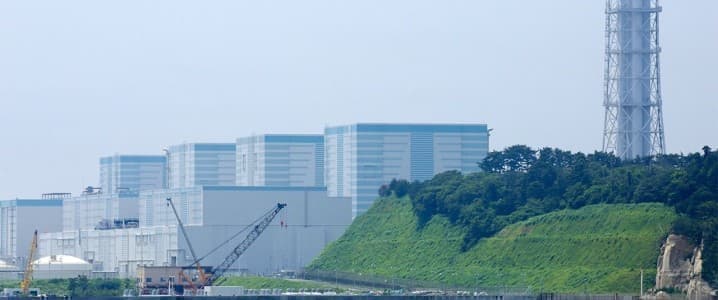Nuclear energy is all about control. The process by which we generate nuclear power, after all, is not so different from the mechanics that take place to trigger an atomic bomb. It’s all about the way in which the process of nuclear fission is tightly controlled, scheduled, and slowed, which makes nuclear energy production possible and safe.
The amount of force that holds the nucleus of an atom together is monumental, and stores a massive amount of energy. When we split atoms into smaller atoms, or “fission fragments”, this energy is released, and in the case of nuclear energy, harvested. But every time an atom is split, it begins a chain reaction triggering more and more atoms to split. So why doesn’t every nuclear fission process turn into a nuclear explosion? Because scientists have gotten very, very good at controlling and slowing down the chain reaction process.
Now, a fairly average-sized (1,000 megawatts) nuclear energy plant produces as much energy in a single day as was released by the atomic bomb that detonated over Nagasaki, a 21 kiloton weapon that leveled 90% of the city. And now, in this day and age, neither a 1,000mw nuclear plant nor a 20kt nuclear weapon are particularly big.
The largest nuclear power plant in the world, Japan’s Kashiwazaki-Kariwa Nuclear Power Station, located on the Sea of Japan around 135 miles northwest of Tokyo, has a staggering maximum capacity of approximately 8,000 megawatts. China’s Taishan Nuclear Power Plant has two individual reactors that each have a production capacity of 1,750 megawatts--nearly twice the power of Nagasaki per day in just one reactor, much less an entire nuclear power plant. And that history-altering bomb itself now seems like child’s play compared to the destructive potential of present-day nuclear warheads. The largest weapon that the United States ever made, the B41 nuclear bomb of 1960–1976 had the truly terrifying yield of 25 Megatons, more than 1,000 times more powerful than the bomb that leveled Nagasaki and killed between 39,000 and 80,000 people.
All of this, in combination with high-profile nuclear disasters over the last few decades, most notably in Chernobyl, Three Mile Island, and Fukushima, has led to a lingering fear and paranoia about the hazard of nuclear energy. It’s easy to see why the perceived looming threat of nuclear meltdown has had serious staying power and continues to shape nuclear policy around the world today. After all, we’re still dealing with the aftereffects of these tragedies. Just last month Japan approved a plan to gradually dump 1.25 million tons of radioactive wastewater into the Pacific Ocean as they run out of storage space to hold the cooling water necessary to keep the Fukushima plant, damaged in a 2011 earthquake and ensuing tsunami, from melting down. At this very moment, Chernobyl is back in the news as the site’s nuclear fuel is once again smoldering in an inaccessible basement, creating the possibility of another nuclear explosion at the site, 35 years later.
All of these stories are worrying--but they are not the full picture. But the reality is that nuclear energy is much, much safer than many of us are led to believe. In fact, a 2013 study published in the peer-reviewed journal Environmental Science & Technology found that up to that point, nuclear energy had actually saved an estimated 2 million lives since 1971. By replacing coal-fired and other high-emissions energy generation, nuclear energy has prevented approximately 1.84 million air pollution-related deaths, as well as kept 64 gigatonnes of greenhouse gas emissions out of the atmosphere. “By contrast,” the paper reads, “we assess that large-scale expansion of unconstrained natural gas use would not mitigate the climate problem and would cause far more deaths than expansion of nuclear power.”
Ultimately, nuclear energy is all about control. With proper training and security measures, nuclear could continue to be a very safe and extremely climate-friendly energy source for the foreseeable future, especially as technology advances and we understand the science and its limitations better than ever.
By Haley Zaremba for Oilprice.com
More Top Reads From Oilprice.com:
- Oil Prices: Few Tailwinds Until Driving Season Begins
- OPEC Slams IEA’s Net-Zero Report As ‘Destabilizing’
- Oil Headed For Biggest Weekly Drop Since March



















Like many, maybe all, such articles, Zaremba's seems to have an agenda of ignoring a rather large elephant: nuclear fuel is ultra-cheap. That means governments can't make back, by taxing it, the money they lose in fossil fuel tax revenues when they allow it to be used.